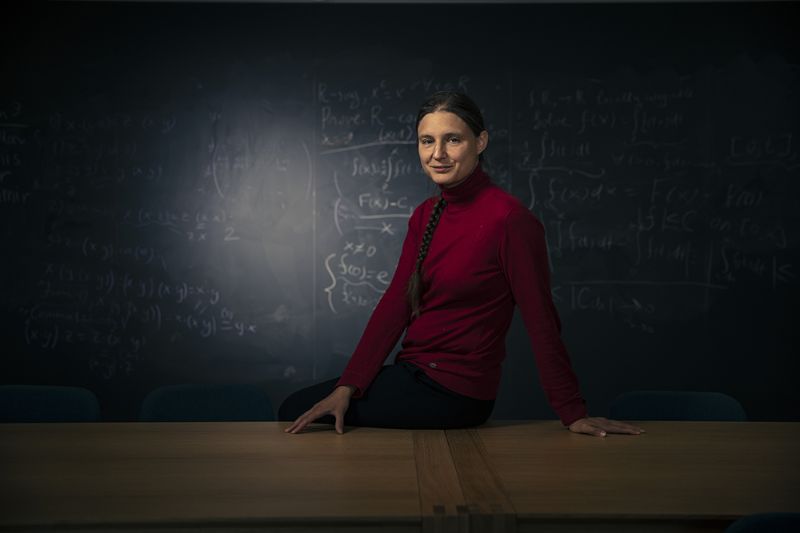
Marina Viazovska
Marina Viazovska: Fields Medalist and Pioneer in Sphere Packing
In 2022, Marina Viazovska, a Ukrainian mathematician, became the second woman ever to win the prestigious Fields Medal. Viazovska was awarded the honor for her remarkable solution to the sphere packing problem in eight dimensions—a breakthrough that has had far-reaching implications in the field of discrete geometry. Her work, recognized for its elegance and innovative techniques, not only solved a centuries-old problem but also advanced the study of Fourier analysis and modular forms. Viazovska’s contributions continue to expand the understanding of higher-dimensional spaces and mark a new chapter in the representation of women in mathematics.
Early Life and Education
Born in 1984 in Kyiv, Ukraine, Marina Viazovska grew up with a strong interest in mathematics, excelling in her studies from a young age. She earned her undergraduate degree from the Taras Shevchenko National University of Kyiv and later pursued graduate studies in Germany, obtaining her PhD in mathematics from the University of Bonn in 2013. Her doctoral thesis focused on modular forms and their applications to mathematical physics, laying the foundation for her future research.
Viazovska’s passion for tackling deep, theoretical problems in mathematics propelled her into areas of research that few others had explored, particularly in the field of sphere packing.
Solving the Sphere Packing Problem in 8 Dimensions
The sphere packing problem seeks the densest arrangement of non-overlapping spheres within a given space. The problem was famously proposed by Johannes Kepler in 1611, who conjectured that the densest packing of spheres in three dimensions is the arrangement of oranges stacked in a pyramid shape (known as face-centered cubic packing). While Kepler’s conjecture was proven for three dimensions in 1998, the question remained open for higher dimensions.
For decades, mathematicians had struggled to find optimal sphere packings in dimensions greater than three. Marina Viazovska’s breakthrough came in 2016 when she developed a solution for the sphere packing problem in eight dimensions, using a structure known as the E8 lattice. The E8 lattice is a highly symmetrical, 8-dimensional geometric structure that provides the densest possible arrangement of spheres in this space. Viazovska’s proof was groundbreaking because it not only solved the problem in eight dimensions but also introduced new tools and methods in Fourier analysis and modular forms that extended beyond sphere packing.
Her work was further extended in collaboration with other mathematicians to solve the sphere packing problem in 24 dimensions, using the Leech lattice—another highly symmetrical lattice structure.
Significance of Viazovska’s Work
Viazovska’s solution to the sphere packing problem is celebrated for its mathematical elegance and its introduction of groundbreaking techniques in discrete geometry. Her methods combined insights from Fourier analysis, modular forms, and number theory, introducing tools that had never been applied to this problem before.
Her work has broad implications beyond pure mathematics. Sphere packing is relevant to fields such as error-correcting codes and data transmission, where finding the most efficient packing of information within a given space is critical. The techniques Viazovska developed have potential applications in physics, communication theory, and information science.
Fields Medal and Recognition
In 2022, Marina Viazovska was awarded the Fields Medal, the highest honor in mathematics, for her contributions to solving the sphere packing problem in eight dimensions. Her achievement marked a historic moment, as she became only the second woman to receive this prestigious award after Maryam Mirzakhani in 2014.
The Fields Medal recognized not only the importance of Viazovska’s specific solution but also the elegance and creativity of her methods, which have opened new avenues of research in discrete mathematics and other related fields.
Legacy and Impact
Marina Viazovska’s work continues to influence the field of higher-dimensional geometry and beyond. Her solution to the sphere packing problem in eight dimensions has not only solved a long-standing mathematical question but has also provided new tools and insights that will guide future research in geometry, number theory, and related areas.
Beyond her technical achievements, Viazovska’s recognition as a Fields Medalist has expanded the visibility of women in mathematics, inspiring future generations of female mathematicians to pursue careers in the field. Her win symbolizes the growing representation of women in elite mathematical circles and highlights the importance of diversity in scientific progress.
Conclusion
Marina Viazovska’s remarkable contributions to mathematics, particularly her solution to the sphere packing problem in eight dimensions, have cemented her place as one of the leading mathematicians of her generation. Her work is not only a triumph in the field of discrete geometry but also a testament to the power of creativity, perseverance, and mathematical rigor. As the second woman to receive the Fields Medal, Viazovska’s legacy continues to inspire mathematicians and students around the world, expanding the boundaries of knowledge in both mathematics and science.



